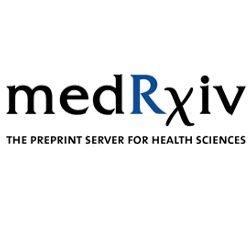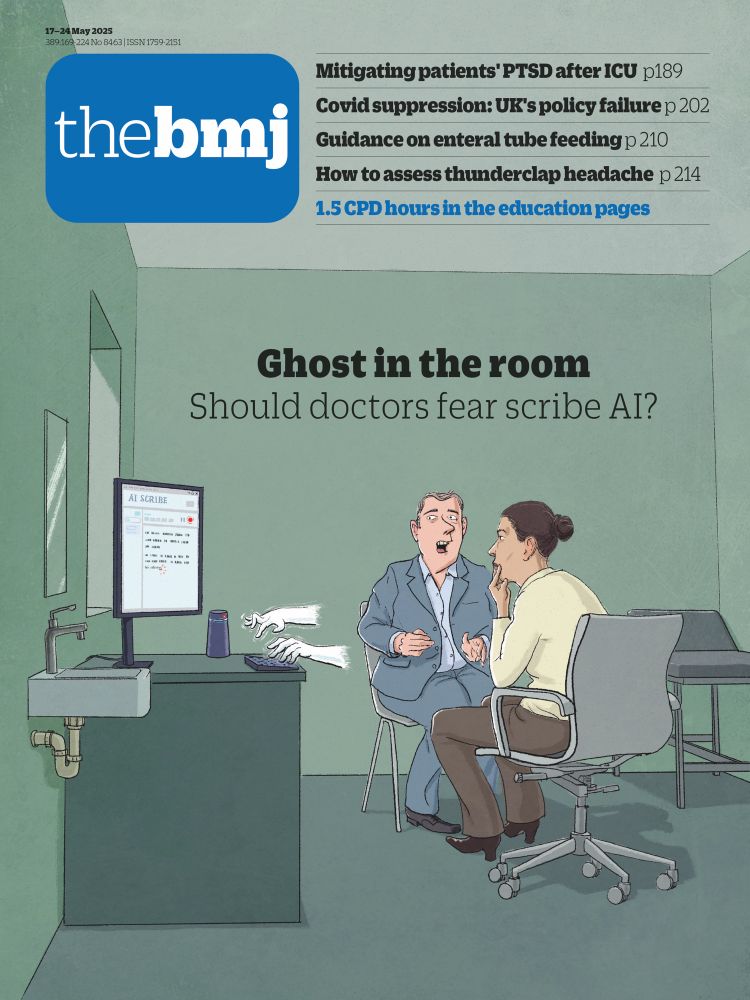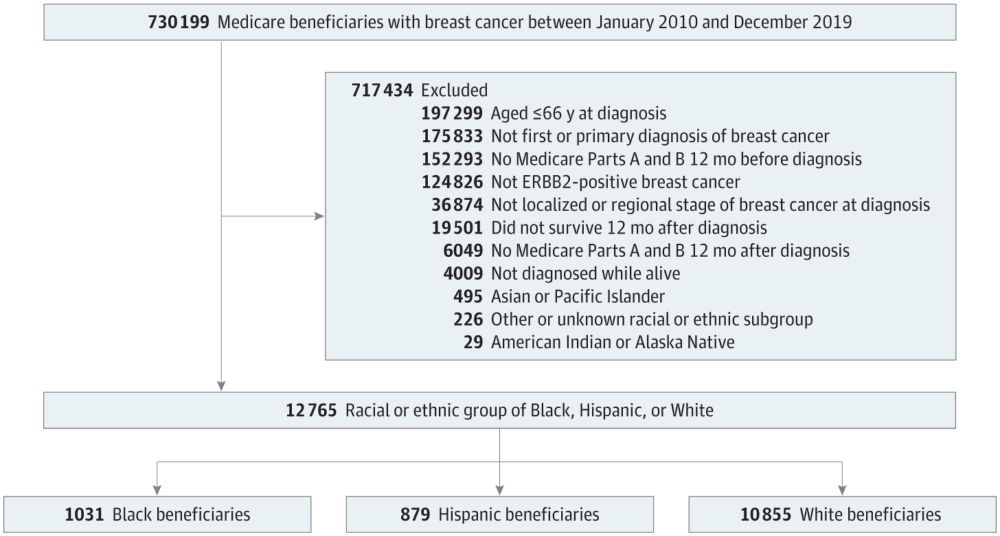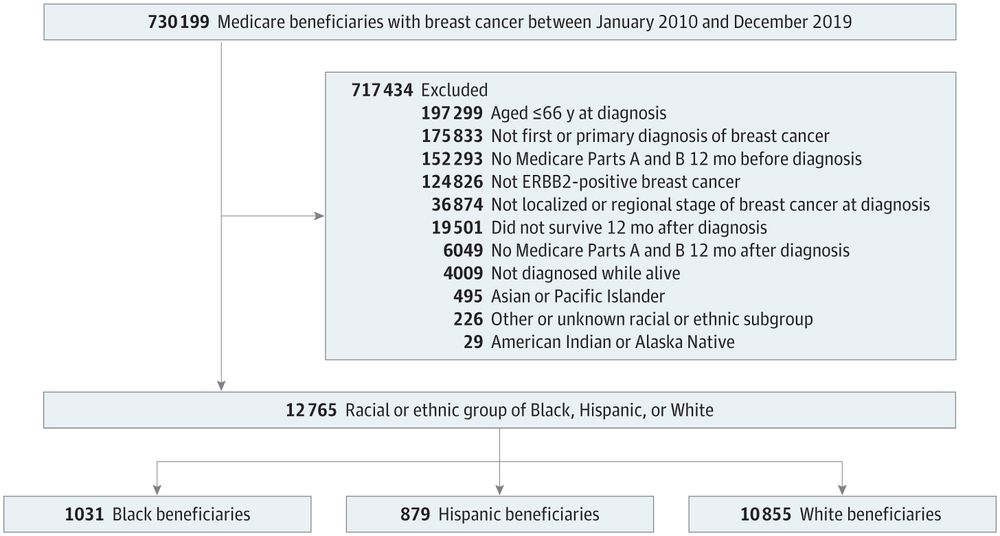
Sud with his family — Sud’s dad is on his left, with Sud’s uncle to the extreme left. Sud’s aunt is on his right, with Sud’s uncle to her right. Sud’s partner, Bailey, is on the extreme right — far-left of the image.

Sud at one of their favorite breweries, Lesser-Known Beer Company, in front of barrels where beers are being aged, wearing a sash that reads “Ph.inisheD” and a decorative gold “PHD” sign hanging above!
All of this will also eventually culminate in my life’s work to intervene on those social and structural determinants to improve health for all!
(3/3)
04.10.2025 16:10 — 👍 4 🔁 0 💬 1 📌 0

A picture of cinnabon delights bought for Sud by their partner, Bailey, with little celebratory PhD signs on toothpicks sticking out from it!

Sud along with their dissertation committee members, who could make it in person to the defense. Two of Sud’s committee members could only join virtually — Dr. Sarah Forrester and Dr. Chris Whitlow.
I’m excited to see the work from my dissertation get out there over the coming months, and to further build upon this work to illustrate the influence of the social and structural determinants of health on dementia.
(2/3)
04.10.2025 16:10 — 👍 4 🔁 0 💬 1 📌 0

Front page of Sud’s dissertation titled ‘Investigating the Relationships of Place-based Social Determinants of Health and Structural Racism with Measures of Alzheimer’s Disease and Related Dementias”.
The rest of the text on the title page reads as follows:
BY
SUDARSHAN KRISHNAMURTHY
A Dissertation Submitted to the Graduate Faculty of
WAKE FOREST UNIVERSITY GRADUATE SCHOOL OF ARTS AND SCIENCES in Partial Fulfilment of the Requirements for the Degree of
DOCTOR OF PHILOSOPHY
Molecular Medicine and Translational Science
May 2025
Winston-Salem, North Carolina
Approved By:
Timothy M. Hughes, PhD, MPH, Advisor
James R. Bateman, MD, MPH, Chair
Sarah N. Forrester, PhD, MS
Da Ma, PhD
Ellen Quillen, PhD
Christopher Whitlow, MD, PhD

Sud standing in a dark blue suit and blue shirt grinning as he wears a sash that reads “Ph.inisheD”.
Not a typical post (🧵) on here, but just over 6 months ago, I successfully defended my dissertation alongside friends, family, my committee, and many loved ones. It was a wonderful day, and I have so many people to thank for their support over the past 3 years and more!
(1/3)
04.10.2025 16:10 — 👍 7 🔁 2 💬 1 📌 0
Starting residency without money for rent or furniture or groceries until
I get my first paycheck mid July. I’m a physician and surgical resident who beat cancer. Please share and donate
25.06.2025 12:59 — 👍 1 🔁 3 💬 0 📌 0

If you would like to donate to an incoming general surgery resident who lost his father after his first year of medical school, who also beat cancer, has food insecurity, & graduated without familial support. All contributions are for a security deposit & rent until I get my first paycheck mid July.
12.06.2025 14:27 — 👍 11 🔁 9 💬 0 📌 5
I’m going to make individual posts for the Palestinian accounts I’m boosting today so they don’t get lost in a thread but if you are looking for them all in one place I’ll link them here 🔽
07.10.2024 10:04 — 👍 2391 🔁 1522 💬 120 📌 112

Donate to Help Dr. Brisbon with Housing & Food for Surgical Residency, organized by Jonathan Brisbon
My name is Dr. Jonathan Lee Brisbon, and I am humbly asking f… Jonathan Brisbon needs your support for Help Dr. Brisbon with Housing & Food for Surgical Residency
I fought cancer. I lost my dad. I became a doctor with no family support. Now I’m weeks away from residency with no housing, no groceries, and no paycheck until mid-July. I’ve come too far to fall now.
Please help.
📲 Venmo: @JBrisbon1181
🙏 gofund.me/850fc46c
#medsky #urosky #mdsky #orthosky
05.06.2025 01:27 — 👍 27 🔁 14 💬 2 📌 1
This is so dystopian… 😭😭 I’m so sorry this happened! Truly, what does qualifying for the paramedics even mean?!
03.06.2025 08:53 — 👍 3 🔁 0 💬 1 📌 0
Public health for the people
25.05.2025 15:59 — 👍 61 🔁 14 💬 2 📌 0
I had to look back at our initial analytic plans and proposals that we drafted, and it was in August 2022 - it caught me off guard too! 😂
Absolutely - this project wouldn't have happened without help from @dusetzinas.bsky.social and Shelley (who isn't on Bluesky yet)! Can't thank them both enough!😊
24.05.2025 12:18 — 👍 2 🔁 0 💬 0 📌 0
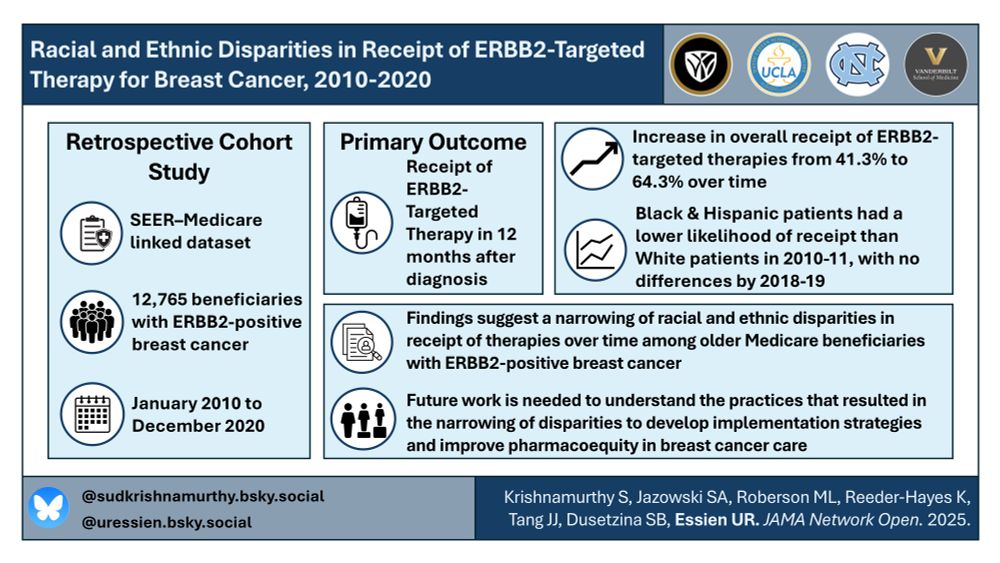
This image is a visual abstract for a paper titled ‘Racial and Ethnic Disparities in Receipt of ERBB2-Targeted Therapy for Breast Cancer, 2010-2020”. This was a Retrospective Cohort study using a SEER-Medicare Linked Dataset. The sample comprised 12,765 beneficiaries with ERBB2-positive breast cancer, and included those diagnosed from January 2010 to December 2020. The primary outcome of the study was receipt of ERBB2-targeted therapy in 12 months after diagnosis. The primary findings showed a) an increase in overall receipt of ERBB2-targeted therapies from 41.3% to 64.3% over time, and that b) Black & Hispanic patients had a lower likelihood of receipt than White patients in 2010-11, with no differences by 2018-19. The findings suggest a narrowing of racial and ethnic disparities in receipt of therapies over time among older Medicare beneficiaries with ERBB2-positive breast cancer. Future work is needed to understand the practices that resulted in the narrowing of disparities to develop implementation strategies and improve pharmacoequity in breast cancer care.
I truly cannot thank this entire team enough for their help in getting this out! (@dusetzinas.bsky.social)
And a special thanks to my mentor, sponsor, and friend in this work, @uressien.bsky.social, for giving me the opportunity to lead this project after we first discussed it back in 2022!
(6/x)
23.05.2025 21:21 — 👍 2 🔁 0 💬 2 📌 0
Our biggest takeaway from these findings is that we must understand the practices that contributed to the narrowing of these disparities, so we may develop more implementation strategies towards improving equitable cancer care! 🎯
(5/x)
23.05.2025 21:21 — 👍 0 🔁 0 💬 1 📌 0
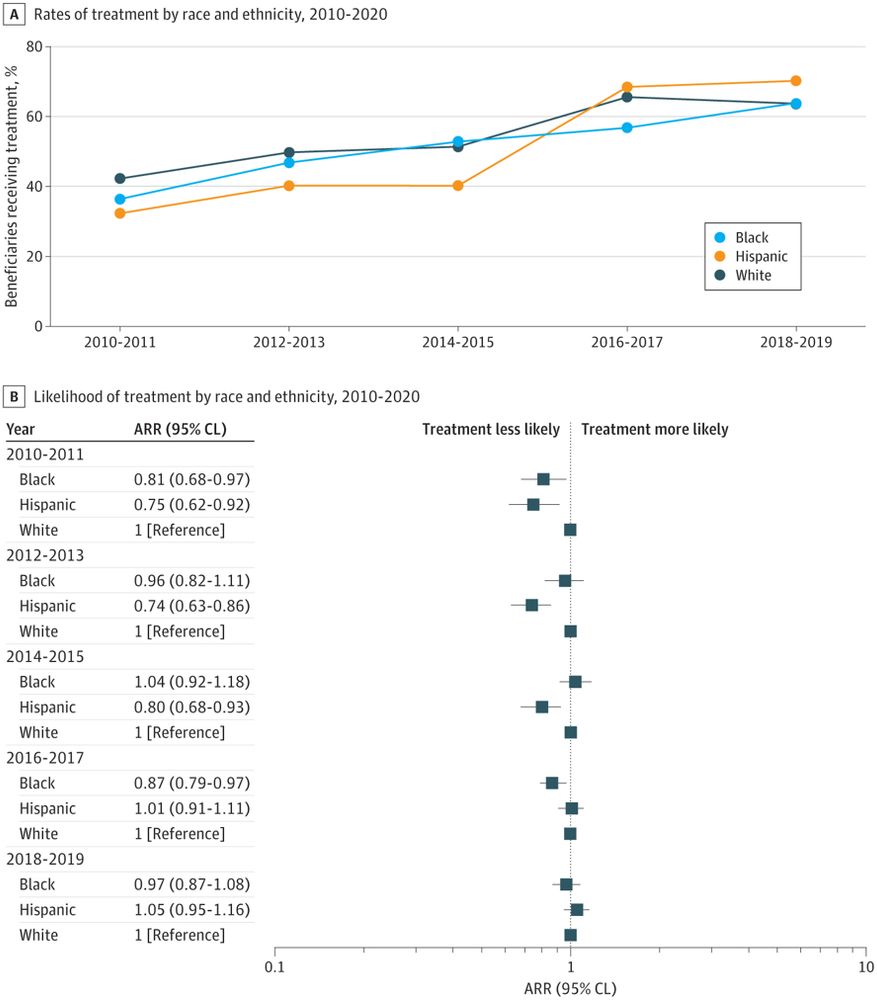
This figure, from the study being discussed, has a line graph of the percentages of beneficiaries receiving treatment by race and ethnicity between 2010 and 2019 in panel A. Below that, in panel B, is a forest plot of the likelihood of treatment by race and ethnicity from 2010 to 2019 from up to down. Both figure panels show a narrowing of disparities, with Black and Hispanic beneficiaries starting off at lower rates of receipt of ERBB2/HER2-targeted therapies in 2010-11, and these disparities not being observed in 2018-19.
Our main finding was a narrowing of racial and ethnic disparities from 2010 to 2019! 📉
In other words, although Black and Hispanic beneficiaries had lower rates of receipt of ERBB2/HER2-targeted therapies than white beneficiaries in 2010, this disparity was no longer seen in 2019.
(4/x)
23.05.2025 21:21 — 👍 0 🔁 0 💬 1 📌 0

This image is a visual abstract for a paper titled ‘Racial and Ethnic Disparities in Receipt of ERBB2-Targeted Therapy for Breast Cancer, 2010-2020”. This was a Retrospective Cohort study using a SEER-Medicare Linked Dataset. The sample comprised 12,765 beneficiaries with ERBB2-positive breast cancer, and included those diagnosed from January 2010 to December 2020. The primary outcome of the study was receipt of ERBB2-targeted therapy in 12 months after diagnosis. The primary findings showed a) an increase in overall receipt of ERBB2-targeted therapies from 41.3% to 64.3% over time, and that b) Black & Hispanic patients had a lower likelihood of receipt than White patients in 2010-11, with no differences by 2018-19. The findings suggest a narrowing of racial and ethnic disparities in receipt of therapies over time among older Medicare beneficiaries with ERBB2-positive breast cancer. Future work is needed to understand the practices that resulted in the narrowing of disparities to develop implementation strategies and improve pharmacoequity in breast cancer care.
To help answer this question, we designed a retrospective cohort study using the SEER–Medicare linked dataset, where the primary outcome was receipt of ERBB2/HER2-targeted therapies in the 12 months after diagnosis, by race and ethnicity.
So, what did we find? ⁉️
(3/x)
23.05.2025 21:21 — 👍 0 🔁 0 💬 1 📌 0

This image is a visual abstract for a paper titled ‘Racial and Ethnic Disparities in Receipt of ERBB2-Targeted Therapy for Breast Cancer, 2010-2020”. This was a Retrospective Cohort study using a SEER-Medicare Linked Dataset. The sample comprised 12,765 beneficiaries with ERBB2-positive breast cancer, and included those diagnosed from January 2010 to December 2020. The primary outcome of the study was receipt of ERBB2-targeted therapy in 12 months after diagnosis. The primary findings showed a) an increase in overall receipt of ERBB2-targeted therapies from 41.3% to 64.3% over time, and that b) Black & Hispanic patients had a lower likelihood of receipt than White patients in 2010-11, with no differences by 2018-19. The findings suggest a narrowing of racial and ethnic disparities in receipt of therapies over time among older Medicare beneficiaries with ERBB2-positive breast cancer. Future work is needed to understand the practices that resulted in the narrowing of disparities to develop implementation strategies and improve pharmacoequity in breast cancer care.
Sharing a short thread here on our recent publication from earlier this month. This project was an incredible team effort, and truly would not have been possible without every co-author on this all-⭐ team!
Go give it a read here if interested: jamanetwork.com/journals/jam...
A short 🧵:
(1/x)
23.05.2025 21:21 — 👍 5 🔁 3 💬 1 📌 0
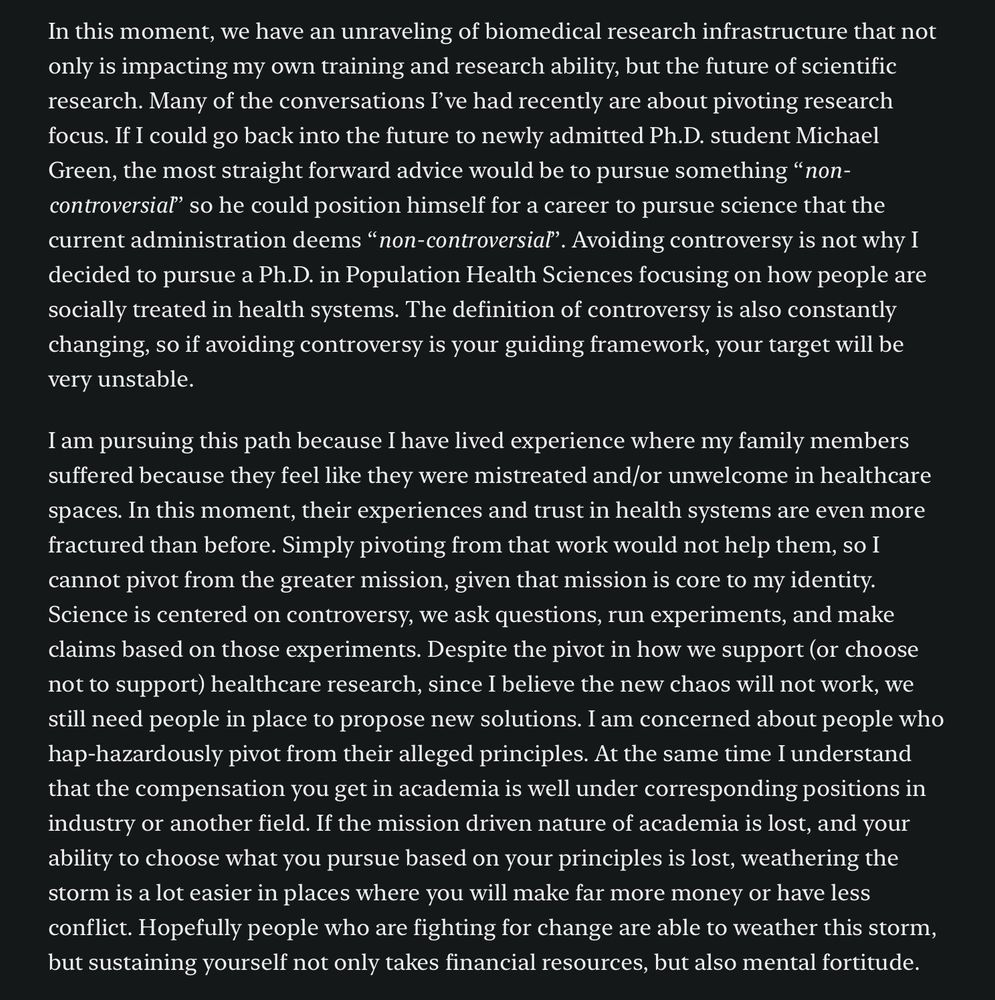
In this moment, we have an unraveling of biomedical research infrastructure that not only is impacting my own training and research ability, but the future of scientific research. Many of the conversations I've had recently are about pivoting research focus. If I could go back into the future to newly admitted Ph.D. student Michael Green, the most straight forward advice would be to pursue something "non-controversial' so he could position himself for a career to pursue science that the current administration deems "non-controversial'. Avoiding controversy is not why I decided to pursue a Ph.D. in Population Health Sciences focusing on how people are socially treated in health systems. The definition of controversy is also constantly changing, so if avoiding controversy is your guiding framework, your target will be very unstable.
I am pursuing this path because I have lived experience where my family members suffered because they feel like they were mistreated and/or unwelcome in healthcare spaces. In this moment, their experiences and trust in health systems are even more fractured than before. Simply pivoting from that work would not help them, so I cannot pivot from the greater mission, given that mission is core to my identity.
Science is centered on controversy, we ask questions, run experiments, and make claims based on those experiments. Despite the pivot in how we support (or choose not to support) healthcare research, since I believe the new chaos will not work, we still need people in place to propose new solutions. I am concerned about people who hap-hazardously pivot from their alleged principles. At the same time I understand that the compensation you get in academia is well under corresponding positions in industry or another field. If the mission driven nature of academia is lost, and your ability to choose what you pursue based on your principles is lost, weathering the storm is a lot easier in places where you will make far more money or have less …
Turned 26 today and recently finished my 4th year of my PhD program, so I wrote a new blog where I did some reflecting on the moment we are in.
Compared to when I applied to grad school in 2020, this is nowhere near what I would’ve predicted. Read here:
open.substack.com/pub/notbeing...
20.05.2025 13:29 — 👍 6 🔁 3 💬 1 📌 0
Donate to my fundraiser if you’d like to help an exhausted girl out <3 meanwhile I’m going to nap and cry ok ty bai
10.05.2025 21:30 — 👍 2 🔁 4 💬 1 📌 2
This sounds incredible - thanks for leading this! I couldn’t make it to SGIM this year, but would love to use any workshop resources that you may be able to share! ☺️
15.05.2025 14:21 — 👍 1 🔁 0 💬 0 📌 0
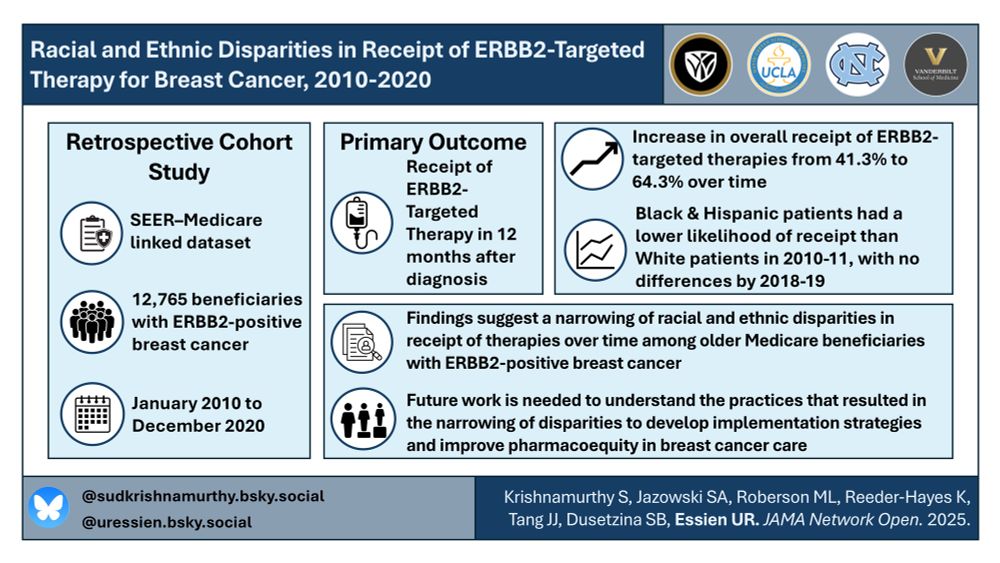
This image is a visual abstract for a paper titled ‘Racial and Ethnic Disparities in Receipt of ERBB2-Targeted Therapy for Breast Cancer, 2010-2020”. This was a Retrospective Cohort study using a SEER-Medicare Linked Dataset. The sample comprised 12,765 beneficiaries with ERBB2-positive breast cancer, and included those diagnosed from January 2010 to December 2020. The primary outcome of the study was receipt of ERBB2-targeted therapy in 12 months after diagnosis. The primary findings showed a) an increase in overall receipt of ERBB2-targeted therapies from 41.3% to 64.3% over time, and that b) Black & Hispanic patients had a lower likelihood of receipt than White patients in 2010-11, with no differences by 2018-19. The findings suggest a narrowing of racial and ethnic disparities in receipt of therapies over time among older Medicare beneficiaries with ERBB2-positive breast cancer. Future work is needed to understand the practices that resulted in the narrowing of disparities to develop implementation strategies and improve pharmacoequity in breast cancer care.
📋‼️Honored to share this newly published article that I helped lead!
Cannot thank @uressien.bsky.social enough - he has served as a friend, mentor, and sponsor throughout! And the whole study team who this wouldn’t have happened without!🙏🏽
Will post a longer thread on the findings soon - stay tuned!
05.05.2025 21:32 — 👍 7 🔁 2 💬 1 📌 0
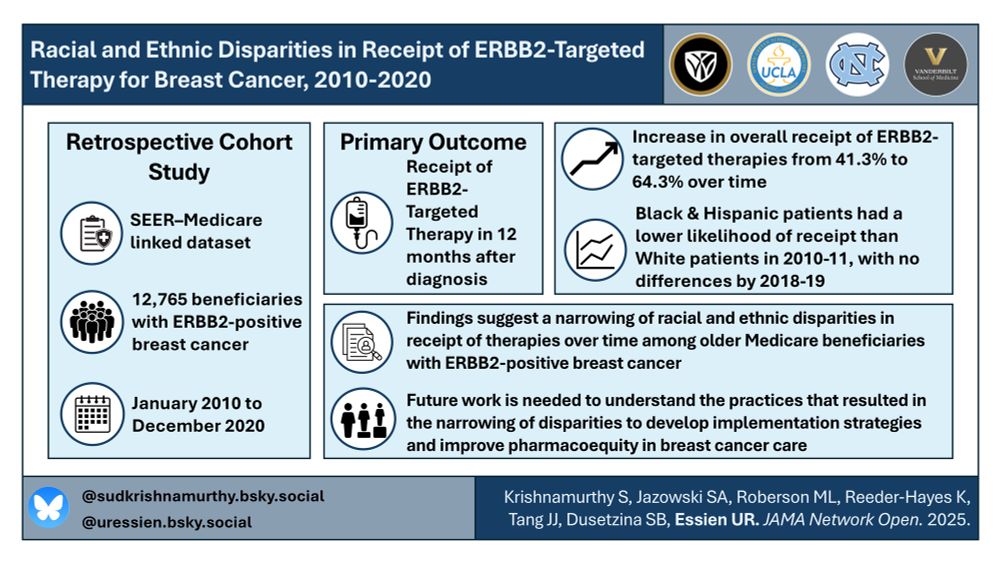
‼️ NEW Paper.
Led by @sudkrishnamurthy.bsky.social we found wide disparities in receipt of ERBB2-targeted 💊 for Medicare enrollees w. breast cancer, disparities that did narrow by 2019.
We need more research to identify strategies to improve cancer #Pharmacoequity.
jamanetwork.com/journals/jam...
02.05.2025 16:08 — 👍 5 🔁 3 💬 0 📌 0
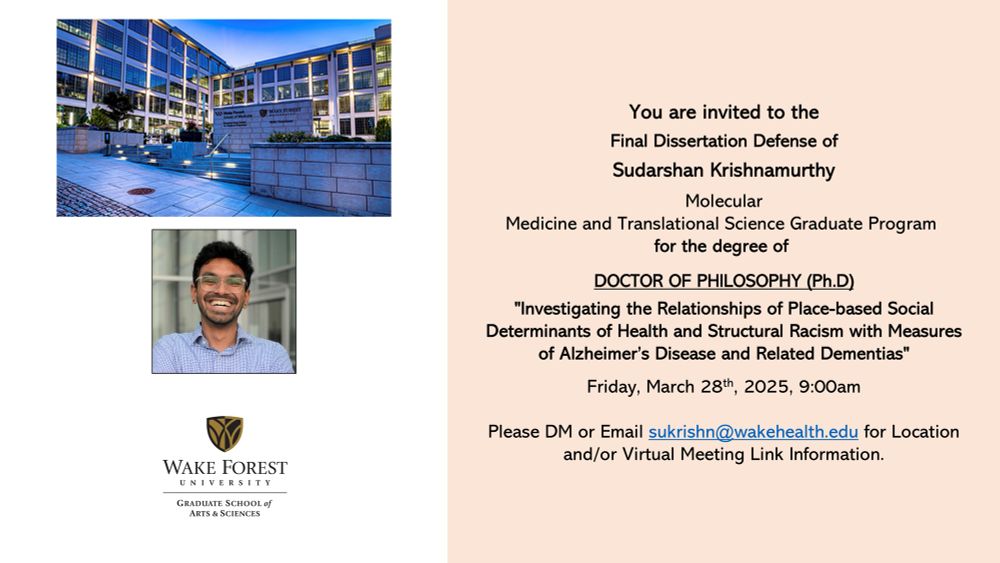
Dissertation defense flyer with a white and cream background. The left hand side has a picture of the Wake Forest School of Medicine, a headshot of Sud smiling in a checked Blue shirt, and a logo of the Wake Forest Graduate School of Arts and Sciences from top to bottom. The right hand side has a block of text that reads as follows:
You are invited to the Final Dissertation Defense of Sudarshan Krishnamurthy
Molecular Medicine and Translational Science Graduate Program for the degree of DOCTOR OF PHILOSOPHY (Ph.D)
"Investigating the Relationships of Place-based Social
Determinants of Health and Structural Racism with Measures of Alzheimer's Disease and Related Dementias"
Friday, March 28th, 2025, 9:00am
Please DM or Email sukrishn@wakehealth.edu for Location and/or Virtual Meeting Link Information.
We’re finally there, y’all! I’ll be defending my final PhD dissertation next Friday, March 28th! Excited to see you on the other side of it!
19.03.2025 23:27 — 👍 9 🔁 1 💬 1 📌 0
Think this is a great time to lift up the legacy and work of W.E.B DuBois and Ida B. Wells in using journalism, ethnography, and data to highlight the propaganda of white supremacy. They were able to pierce through official lies with meticulous work and compelling methods of communication.
05.03.2025 17:05 — 👍 1115 🔁 395 💬 12 📌 15
A Global Health Coalition committed to stopping genocide
IG: DoctorsAgainstGenocide
Web: http://DoctorsAgainstGenocide.org
Non-Governmental & Nonprofit Organization doctorsagainstgenocide.org
Worker-owned, community-oriented intersectional feminist journalism to unfuck your algorithm.
🔗 theflytrapmedia.com
Geriatrician keeping it old school. 👵
Also created a course to help Type A brains chill out.
🧠 https://stress-freeproductivity.thinkific.com/products/courses/stress-free-productivity
Academic internist. Eyes open recruiter. 🙌🏼➡🇺🇸⚓➡⛰🦁🍫➡🏔🦬#CanesFamUnited #ForgedByTheSea #This #LetYourLightShine. Tweet/💬/🔁/💓/follow≠endorse
JAMA Network Open is a member of the JAMA Network, a consortium of peer-reviewed, general medical and specialty publications.
🌐 JAMANetworkOpen.com
ER doc at Northwestern & @BedsideMedNU.bsky.social
interests include social media for medical journals and medical education, health policy, and airway management
amateur guitar gear nerd
opinions are mine, arent medical advice
ja.ma/seth
Yup, same one from the bird app.
Proud mom | Beloved wife |Cherished daughter | Irritable sister | A1 aunty | Chill friend | Relentless foe | Globally Black.
Also an accidental academic (sociologist & health services researcher) and a reluctant low level univ. admin. Views are mine.
Curly hair enthusiast, ☭, mom, abortion aficionado, misplaced Kentuckian, Berliner, Colonel Sanders chronicler, recovering lawyer, contributing writer @therealnews.com Social Media etc for @burnitdownkimbrown.bsky.social
Always Antifascist
Health services researcher, primary care doctor, and writer | Associate Professor @HarvardMed @BrighamDGIM via @MassGeneral @BostonGlobe | Associate Editor @JAMAInternalMed
Preventive medicine/public health physician, clinical data scientist. Driven to prevent chronic disease with big data. MD/MBA at Duke, currently preventive medicine residency at UNC. jaylusk.md
A blog by @michaeldgreen.com, a Population Health Sciences researcher focusing on social inequities, where he will think about topics that are nuanced. Blog topics primarily surrounding Health Equity, sometimes I will meander.
www.notbeinggreen.com
Asst Professor, physician + researcher (PTSD, pain, political economy). 🇩🇿 Put People First! PA taught me to organize. opinions are my own.
Clinical psychologist and researcher. My goal is to improve the quality of life of people with chronic pain by improving treatment and treatment delivery. Views are my own.
UCSF doctors, Eric Widera & Alex Smith, invite the brightest minds in geriatrics, hospice, & palliative care to talk about topics that you care most about, ranging from recently published research in the field to controversies that keep us up at night.
#Geriatrics Division, University of California, San Francisco
@UCSF | Improving the lives of #olderadults through teaching, discovery, and the care of patients
Doctor I PGY1 General Surgery I Fitness Enthusiast I Cancer Survivor #medsky #urologysky
Immigrant. Digital health equity researcher. Hospitalist.
Palliative Care Physician and Researcher @MGH.
Promoting improved patient care, research & education in primary care and general internal medicine. Join the conversation for #SGIM26!






